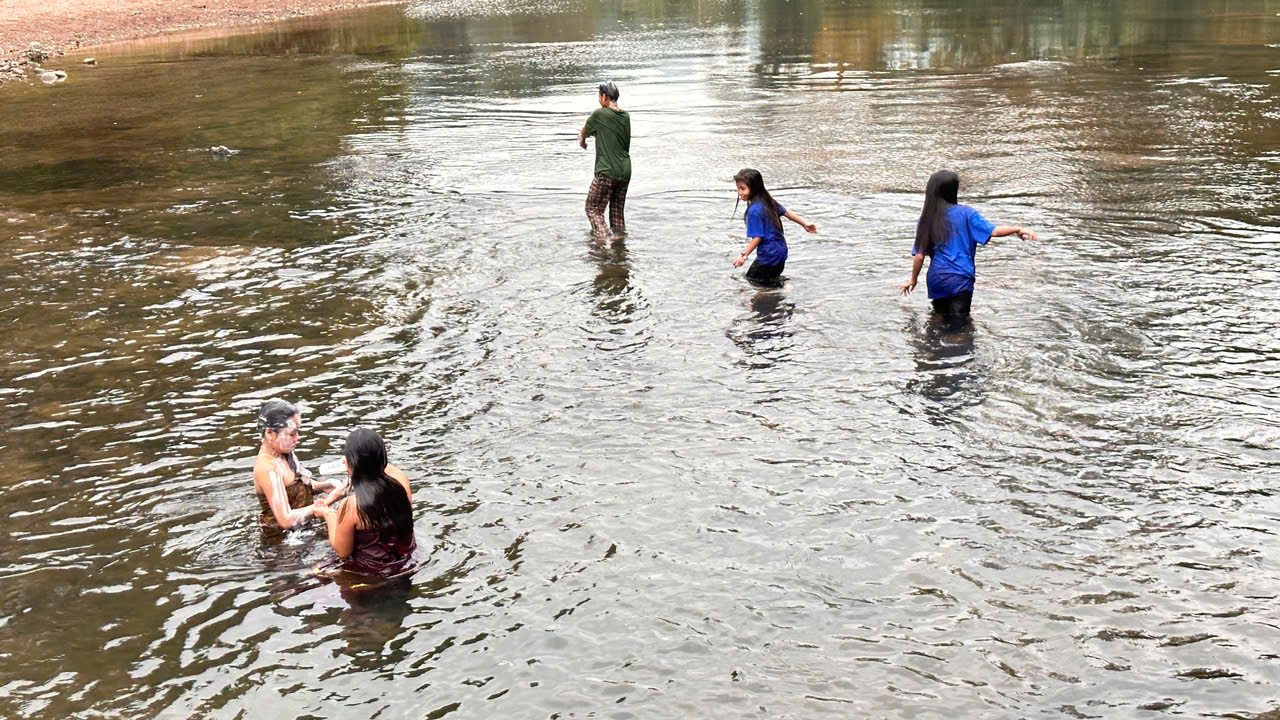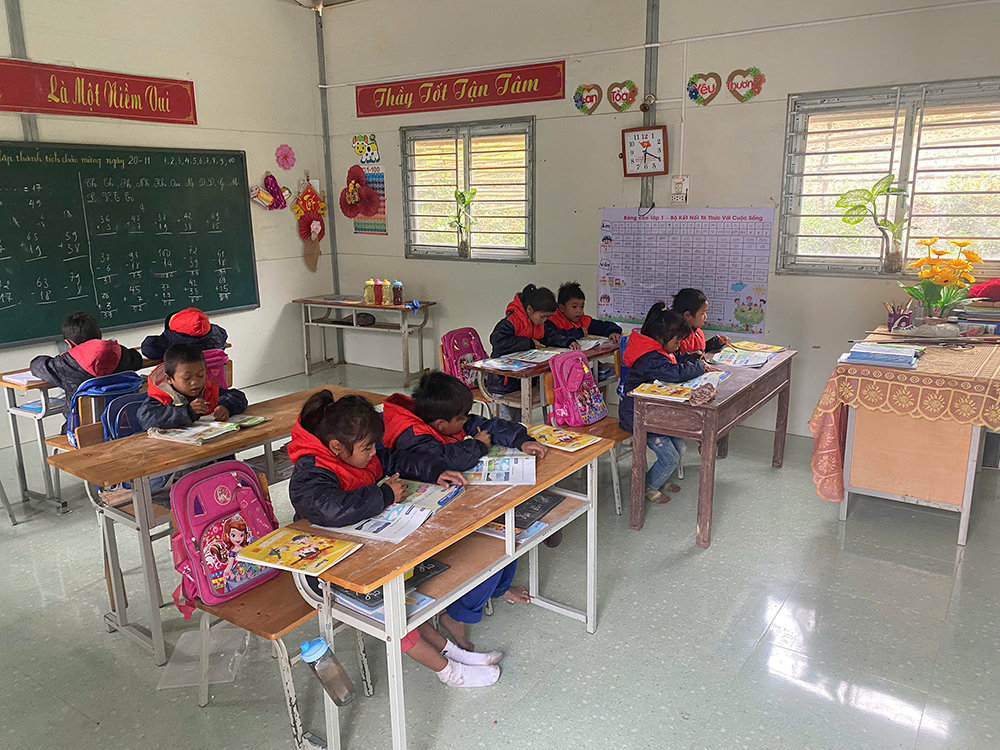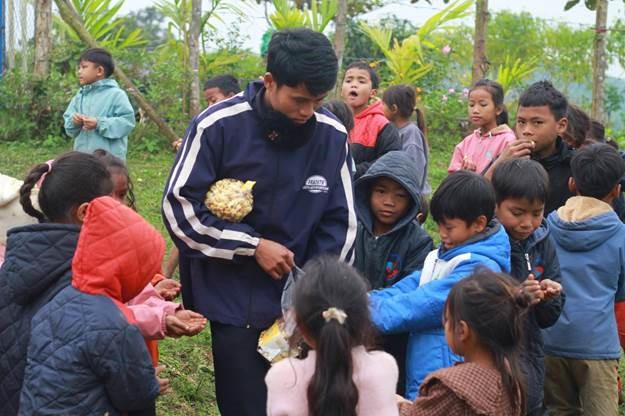Worries over bathing in streams at remote boarding school
In 7-9°C weather, Y Phuc, a 9th grader in Quang Tri province, still bathes in the stream with friends. The boarding school she attends, her "second home," has no bathrooms and its toilet facilities are overloaded.
Phuc is a student at Bo Trach Ethnic Minority Boarding School in Thuong Trach commune, Quang Tri province (formerly Bo Trach district, Quang Binh province). Like most of her classmates, she lives at the school and only returns home a few times a year for holidays like Tet and summer break. Each trip home requires a half-day walk.
Phuc describes the school as her second home. Attending school brings her joy because she has many friends and receives care from teachers. Born into a struggling ethnic minority family, Phuc's meals, accommodation, and occasional clothes are provided by teachers who collect donations from the lowlands.
Her only wish for the school is to have bathrooms so students can avoid bathing in streams and rivers, especially during the rainy season, and more spacious restrooms to avoid having to use the forest.
 |
The "bathroom" for Y Phuc and her friends at Bo Trach Ethnic Minority Boarding School is a nearby stream. Photo: Hope |
The "bathroom" for Y Phuc and her friends at Bo Trach Ethnic Minority Boarding School is a nearby stream. Photo: Hope
Schools without bathrooms and inadequate sanitation for decades
Bo Trach Ethnic Minority Boarding School was built in 2006. It houses 269 students from 6th to 9th grade and 34 teachers. The school has 10 classrooms, 16 student dormitories, and 11 teacher accommodations. However, for almost 20 years, it has never had bathrooms.
Principal Hoang Duc Hoa began working at the school in 2020. He recounted that back then, the school didn't even have toilets or electricity. Only in the past year, with the arrival of electricity in the area, has the school been able to dig a well, pump water, and install some water taps. However, only male students use these taps. Female students, due to shyness in crowded areas, still bathe in the stream.
The lack of bathrooms for students is a major concern for the teachers. "We feel for the students who have to bathe in the stream even in freezing 7-9°C weather, and we worry about them skipping school after going to bathe so far away," said Mr. Hoa.
Literature teacher Hoai Thanh explained that all students at the school are from disadvantaged ethnic minority families. They have limited awareness of the importance of education, and many take advantage of bath time to return to their villages, requiring teachers to search for them throughout the night and bring them back.
"Students here lack awareness of gender and early marriage; many 8th and 9th graders leave school to get married," Ms. Thanh said. On a positive note, in recent years, with improved school facilities and teacher encouragement, "the number of students dropping out has significantly decreased, and teachers have less need to search for and bring them back," Ms. Thanh said happily.
Ms. Thanh also recalled an incident where students developed rashes after bathing in the stream, which then spread among them. The school's medical staff had to treat them for a long time. Teachers also took turns boiling water for the students to wash their clothes to completely eradicate the skin condition. Without bathrooms, the school only has three toilet blocks, each with two stalls. When needing to address personal hygiene, Y Phuc and her friends often leave the school and go into the forest.
The lack of bathrooms also makes the already difficult lives of the teachers living on-site even harder. Mr. Hoa recalled that when he first arrived, the teachers' living quarters had no toilets or kitchen. Thanks to the support of benefactors, the school received some corrugated iron sheets. The male teachers, acting as builders and carpenters, constructed a kitchen that also serves as a bathing area for the teachers.
For years, the teachers have longed for improved school facilities, such as dedicated rooms for art, music, and a laboratory. Besides academics, they also worry about the school's sanitation facilities.
Scenes from the opening ceremony of the 2025-2026 school year at Bo Trach Ethnic Minority Boarding School. Photo: Duc Hoa
Also in Thuong Trach commune, Thuong Trach 2 Primary School has seven campuses scattered across various villages. Many of these campuses lack student restrooms.
 |
The joy of students at village 51 campus, Thuong Trach 2 Primary School, during a visit by a charity group in 12/2024. Photo: Phan Duong |
Students in a combined class at Aky campus. Photo: Phan Duong
One example is the Aky campus, located deep in the mountainous forest of Thuong Trach commune, a one-hour walk from the Lao border and about a four-hour drive from Dong Hoi. Aky has no electricity, internet, or phone signal (teachers must travel 5-6 km to get a signal). With limited arable land, the residents are all ethnic minorities and 100% of households are impoverished. Village head Dinh Tieng stated in 12/2024 that Aky has 44 households with 150 residents, including 20 secondary school students and 22 primary school students. To date, no student from the village has reached high school.
Aky campus has only two classrooms with a total of 21 students. In Nguyen Thi Kim Ngan's combined class of 1st, 2nd, and 3rd graders, students have to sit back-to-back to see the two blackboards. In Nguyen Quang Trung's 4th and 5th grade class, one blackboard has to be split in half. With a total area of only 200 m2, including two classrooms and a playground, the school still lacks student restrooms. There is only one traditionally built toilet (a pit latrine treated with lime and sawdust, not a self-composting type) for teachers.
The survey team from the Department of Education and the Hope Foundation visiting the Aky school facilities (left). Outside a classroom at Aky school (center). Teacher's accommodation (right). Photo: Hope
Tran Trung Kien, vice principal of Thuong Trach 2 Primary School, who is in charge of the campuses in villages 61, Tuoc, Troi, and sometimes Aky, said that in campuses without self-composting toilets like Aky, students habitually urinate against the cliffs next to the school.
Mr. Kien is concerned about the impact of poor facilities on student health. He noted that students can't go too deep into the forest for toilet needs due to safety concerns, but going too close to the school affects overall hygiene.
"The rate of malnutrition and stunting among students is generally high due to poor nutrition from a young age, caused by difficult family circumstances," Mr. Kien added.
Health experts also point out that unsanitary living environments can cause intestinal diseases and hinder nutrient absorption, contributing to poor health in children.
Along with Aky, Thuong Trach 2 Primary School also has campuses in villages 61, 51, and Co Do that lack student restrooms. Each of these campuses has only three classrooms, with a total of 35, 32, and 46 students respectively, studying in combined classes across different grade levels.
 |
The joy of students at village 51 campus, Thuong Trach 2 Primary School, during a visit by a charity group in 12/2024. Photo: Phan Duong
Joy for the new school year
During the last summer break, numerous projects to build classrooms and restrooms for remote schools in Quang Tri province, supported by the Hope Foundation, began construction and are being expedited for completion before the new school year.
The Aky campus is among the projects fully funded by the School Hygiene Program. The design includes a four-stall, self-composting toilet block, fulfilling the wishes of the teachers and students.
The School Hygiene Program is also constructing separate bathroom facilities for male and female students at Bo Trach Ethnic Minority Boarding School, along with a six-stall toilet block, addressing the current shortage.
In addition, the program has initiated 18 other sanitation projects for schools in Bo Trach and Thuong Trach communes, Quang Tri province. These projects are expected to be handed over to the local education authorities by the end of September.
The School Hygiene Program, implemented by the Hope Foundation since 2022, is now in its 4th year. Opella Vietnam and the Enterogermina brand are continuing their partnership with the Hope Foundation to fund the project, contributing to improving the quality of life and creating a safe and healthy learning environment for children in disadvantaged areas. Between 2022 and 2024, they supported the construction of 60 sanitation facilities, directly benefiting nearly 19,000 students and teachers in Son La, Ha Giang, Yen Bai, and Lai Chau provinces. "I highly appreciate the project's achievements," shared Valentina Belcheva, General Director of Opella Vietnam. "As a company operating in the healthcare sector, we understand the importance of self-care and the impact this project brings to the community. With the upcoming destination in Quang Tri, I believe our project will continue to bring positive changes, creating a better educational environment for Vietnamese children." |
Diep Chi












